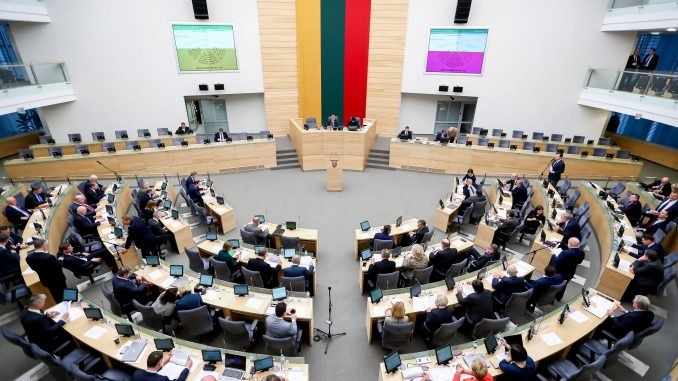
According to the draft agreement, political parties would take on the commitment to gradually increase defense spending to 2.5 percent of GDP by 2030, up by 0.5 percentage points from this year’s target of 2 percent.
The document, obtained by BNS, does not set out a concrete position on introducing universal conscription, but calls for decisions on this issue to be made in 2022.
Prime Minister Saulius Skvernelis plans to discuss the proposed agreement with parties’ leaders next week.
LSDP leader Gintautas Paluckas said that his party will not support initiatives to spend a higher share of GDP on defense.
“Commitments until 2030 are inadequate: governments will change, parties will change. (…) the economic cycle will change, too. Everything won’t be constantly growing,” he told BNS.
Paluckas said that the Social Democrats would likely approve a higher share of GDP on social service as an alternative to military service.
Other parties told BNS that they have comments and suggestions, but are not opposed to such a defense deal.
Rasa Juknevičienė of the conservative Homeland Union–Lithuanian Christian Democrats described the agreement as being “too little ambitious”, saying that her party believes that the defense budget should be raised at a faster pace.
“It’s better than those proposed earlier,” she said. “It won’t do anything bad, but we, the Homeland Union, want that Lithuania should not slow the pace of defense funding.”
Order and Justice leader Remigijus Žemaitaitis said that his party will likely sign the deal if its proposals are taken into consideration.
Valdemar Tomaševski, leader of the Electoral Action of Poles in Lithuania–Christian Families Alliance (LLRA-KŠS), said that his party would back the proposal if it ensured support for Lithuania’s military industry.
“If that 2.5 percent is invested in the defense industry, in production, then yes,” If we spend the money to buy weapons from other countries (…), then I have doubts”.
Eugenijus Gentvilas, head of the Liberal Movement‘s political group on the Seimas, said that the Liberals will likely back the deal.
“We are inclined to sign, but we’ll be able to have a clear opinion on Monday after an analysis is carried out,” he said.
Gediminas Kirkilas, chairman of the Lithuanian Social Democratic Labor Party (LSDDP), said that his party supports the agreement.
“Politically, it’s very important (to sign it) now,” he said.
Ramūnas Karbauskis, leader of the ruling Lithuanian Farmers and Greens Union (LVŽS), also said that he will back the deal, which he said sets out the guidelines for the development of a consistent national defense system.
The last time the country’s political parties signed an agreement on defense and security policy was in 2014, shortly after the annexation of Crimea by Russia. Its key provision of increasing defense spending to 2 percent of GDP is set to be implemented this year.
An attempt to sign a new agreement failed early this year over disagreements on a further increase in defense spending.
